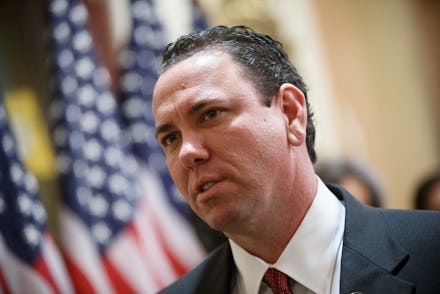A Politician Just Accidentally Confirmed Our Suspicions About How Washington Works

The news: Rep. Vance McAllister (R-La.) — the same congressman who was caught on camera kissing a staffer who was not his wife — has made some unfortunate news again. "McAllister just openly acknowledged that members of Congress expect to receive campaign contributions in return for votes on legislation." TPM Reporterd
While speaking at the Northeast Chapter of Louisiana CPAs, McAllister told a story about how "money controls Washington," according to the Ouachita Citizen, describing how many in D.C. approach their work as a "steady cycle of voting for fundraising and money instead of voting for what is right."
Discussing a bill related to the Bureau of Land Management, which he voted against, McAllister shared that an unnamed colleague promised he would receive a contribution from the conservative Heritage Foundation if he voted against the bill.
"I played dumb and asked him, 'How would you vote?'" McAllister said during the talk. "He told me, 'Vote no and you will get a $1,200 check from the Heritage Foundation. If you vote yes, you will get a $1,000 check from some environmental impact group.'"
According to McAllister, the answer came as a surprise. (He now insists he was taken out of context.) The original Ouachita Citizen story quickly blew up on Reddit, where commentators debated whether this activity would constitute corruption in the eyes of the FBI.
Well, would it? Not exactly. Implicit bribes are not the same as explicit bribes, even though they warping our political system in the same fundamental way. If the Heritage Foundation (which doesn't issue donations; its sister organization Heritage Action does) had explicitly offered McAllister a bribe or created a way for party caucus superiors to manipulate the vote, that would be a prosecutable offense. But just acknowledging that these kind of quid pro quo relationships with special interests exist is not illegal.
Most of the influence that money buys is completely legal. Special interests are expected to donate to politicians who cater to them. Voters, special interest groups and monied elites will always try to influence pandering politicians. None of this necessarily constitutes explicit bribery. This is nothing new. If it's a surprise, then you're way behind.
What is relatively new is that the U.S. political system, which has always dealt with some level of corruption or another, is dealing with a deluge of money unleashed by Supreme Court decisions in Citizens United v. FEC and McCutcheon v. FEC, which respectively disgarded restrictions on corporate election donations and aggregate campaign contribution limits. The end result is an electoral system that's opaque, money-driven and beholden to special interests and the rich. And with the massive holes the two decisions opened up in the campaign finance system, it would be extraordinarily difficult for reporters or investigators to look into many cases anyhow. Stephen Colbert was easily able to set up a system for shuttling anonymous donations to his satirical super-PAC using a shell corporation.
As the Washington Post's Philip Bump notes, McAllister's story doesn't necessarily hint at illegal activity because $1,000 or so is peanuts compared with an ethics violation. It's also likely that a GOP representative would have interests naturally aligned with the Heritage Foundation in any case. A study earlier this year found that the real effect of money may be to buy access and face-time with legislators. Essentially, officials' offices are much more likely to arrange meetings with people who identify themselves as donors.
So rest easy, fellow Americans. Your representatives in Congress might well indeed be selling out the country, but it's totally on the books. Assuming they're even required to keep them.
An earlier version of this article did not cite TPM by name and did not include quotes around the phrase "McAllister just openly acknowledged that members of Congress expect to receive campaign contributions in return for votes on legislation." The story has been updated to fully attribute TPM's language.